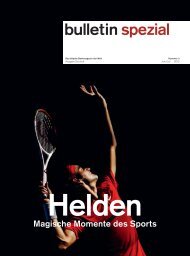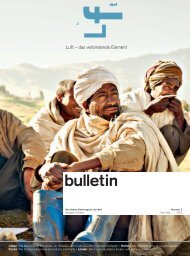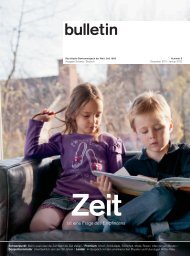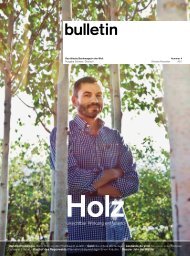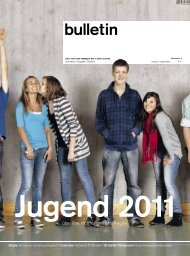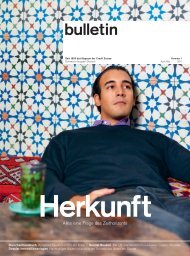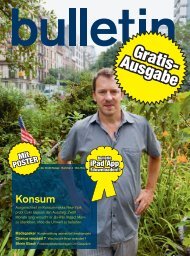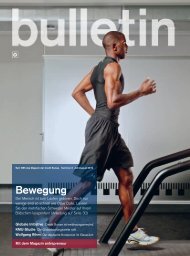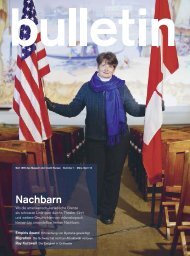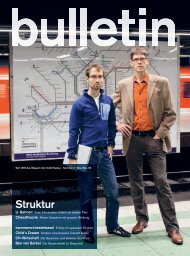Innovation
Global Investor Focus, 02/2007 Credit Suisse
Global Investor Focus, 02/2007
Credit Suisse
Create successful ePaper yourself
Turn your PDF publications into a flip-book with our unique Google optimized e-Paper software.
GLOBAL INVESTOR FOCUS <strong>Innovation</strong> — 48<br />
Authors<br />
Arthur Vayloyan....................................................................................... 03<br />
As a member of the Private Banking Management Committee of Credit Suisse<br />
and Head of Investment Services and Products Arthur Vayloyan has the responsibility<br />
for integrating and delivering Credit Suisse’s products and services to the<br />
Private Banking units around the globe. Since joining Credit Suisse in 1992, he<br />
has been in charge of the Representative Office in Uruguay, led the Latin<br />
America/Iberia desk and was Head of Private Banking Switzerland. He is particularly<br />
interested in nanotechnology, innovation and microfinance. He was an<br />
invited speaker at the United Nations during the Year of Microcredit and he<br />
serves on the board of responsAbility Social Investment Services AG (see page<br />
22, 23). Arthur Vayloyan has a Ph.D. in Physical Chemistry from the University<br />
of Berne and received his MBA from the French business school INSEAD.<br />
Chris Anderson.................................................................................. 14–19<br />
Chris Anderson has been Editor-in-Chief of “Wired” magazine since 2001. He<br />
previously worked for the two leading scientific journals “Science” and “Nature”<br />
and was an editor for business magazine “The Economist” for seven years, where<br />
he was responsible for writing articles in London, Hong Kong and New York<br />
covering topics such as the US economy and technology, among others. In an<br />
article published in “Wired,” “The Long Tail”, he defined a new economic model<br />
describing the business potential of niche products. Anderson later expanded<br />
the article into a book titled “The Long Tail: Why the Future of Business is<br />
Selling Less of More.” Chris Anderson was born in 1961, studied physics at<br />
George Washington University, and today lives with his wife and four children in<br />
Berkeley, California.<br />
Giles Keating................................................................................... 06–09<br />
Giles Keating is a Managing Director and Head of Research at Credit Suisse<br />
Private Banking and Chairman of the Global Economics and Strategy Group,<br />
which brings together top macroanalysts from all divisions of Credit Suisse.<br />
Before that he held positions as Head of the Pensions Advisory and Structuring<br />
Group, Head of Fixed Income Research and Economics, and Chief Economist<br />
at Credit Suisse Investment Bank. Prior to joining Credit Suisse in 1986, Giles<br />
Keating was a research fellow at the London Business School Centre for Economic<br />
Forecasting. He received his B.A. in Philosophy, Politics and Economics<br />
from St Catherine’s College, Oxford University, and his M.Sc. in Mathematical<br />
Economics and Econometrics from the London School of Economics.<br />
Giovanni Dosi.................................................................................... 10–13<br />
Giovanni Dosi is Professor of Economics at the Sant’Anna School of Advanced<br />
Studies in Pisa, where he also coordinates the doctoral program in economics<br />
and management. His major research areas include the economics of innovation<br />
and technological change, industrial organization and industrial dynamics,<br />
theory of the firm and corporate governance, and economic growth and development.<br />
He is author and editor of several works on economic innovation, industrial<br />
economics, evolutionary theory and organizational studies. Professor Dosi<br />
is codirector of task forces on industrial policy and intellectual property rights<br />
within the Initiative for Policy Dialogue at Columbia University. He is a research<br />
consultant for the OECD, the Brazilian Ministry of Planning, UNCTAD, the French<br />
Ministry of Research, the Italian Ministry of Research, the European Commission<br />
and the Bank of Italy among others. He is Visiting Professor at the University of<br />
Manchester and Honorary Research Professor at the University of Sussex.<br />
Richard Weingarten......................................................................... 20–23<br />
Richard Weingarten joined the United Nations Capital Development Fund in<br />
2005 as Executive Secretary. In 1991, he established Richard Weingarten &<br />
Company, Inc. to provide a broad range of financial advisory and investment<br />
banking services to clients in both the private and non-profit sectors. The firm<br />
assisted clients with strategic, financial and operational issues, including financings,<br />
mergers and acquisitions, and strategic alliances. As investment banker<br />
Richard Weingarten had worked with many non-profit organizations, particularly<br />
in the area of economic development. In various roles he traveled to Asia,<br />
Africa and Latin America. His experience includes working on microfinance and<br />
local development projects. Mr. Weingarten has held several board positions for<br />
a number of non-profit organizations.<br />
C. K. Prahalad................................................................................... 24–27<br />
C. K. Prahalad is Professor of Corporate Strategy at the University of Michigan.<br />
He previously studied physics at the University in Madras, India, and graduated<br />
from Harvard University. The Indian economist’s interests include management<br />
methods at multinational companies and innovative business models aimed at<br />
alleviating global poverty. He has published numerous works, including: “The<br />
Fortune at the Bottom of the Pyramid: Eradicating Poverty through Profits” as<br />
well as “The Future of Competition: Co-Creating Unique Value with Customers.”<br />
C. K. Prahalad is frequently described in surveys as one of the most important<br />
researchers, and “Business Week” magazine also lauded him as probably the<br />
most influential thinker in the field of corporate strategy.<br />
Niraj Dawar....................................................................................... 28–31<br />
Niraj Dawar is Barford Professor of Marketing at the Richard Ivey School of<br />
Business, University of Western Ontario, Canada. His research interests cover<br />
brand equity, brand strategy and global marketing. His current research focuses<br />
on the impact of corporate and managerial actions on brand equity and marketing<br />
strategies in international contexts. His papers on brand extensions, consumers’<br />
use of brand and other signals as well as international consumer behavior<br />
have appeared in a number of publications, including the “Journal of Marketing”,<br />
“Journal of Marketing Research”, “Harvard Business Review”, “Journal of Consumer<br />
Psychology”, “Marketing Letters”, “Journal of Business Research”, the “Journal<br />
of International Business Studies” and other outlets. Prior to joining the Ivey<br />
Business School, he was Associate Professor of Marketing at INSEAD, France.




